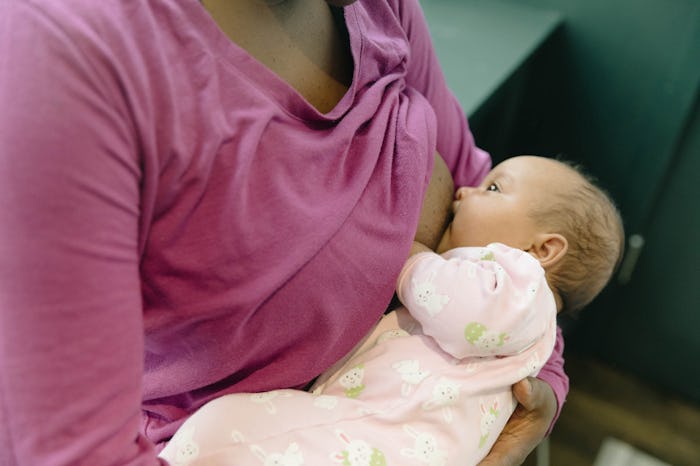Life
This Is Why Breastfeeding Babies Get Dehydrated, According To Experts
It's common for almost every new parent to worry about how much milk their baby is consuming. It can be hard to tell, especially with breastfeeding mothers. There's an unforgiving learning curve when you're nursing, and you can't really measure your milk. Inevitably this all leaves a lot of concerned parents asking themselves, "Can breastfed babies get dehydrated?" To be honest, dehydration can happen in breastfed and formula-fed babies. As long as you recognize the signs of dehydration, however, your baby should be OK.
Dehydration most often occurs in infants born to first-time moms, according to La Leche League International (LLLI). This isn't a slight to new moms. It's just that they might not have developed adequate breastfeeding skills yet. Additionally, many new moms are instructed to have a "breastfeeding schedule" with their babies. I was encouraged by hospital staff to have one with my first baby. These schedules, especially if kept strict, can be problematic. "Breastfed babies can get dehydrated if mom is not putting baby to the breast frequently enough," Lamaze Certified Childbirth Educator (LCCE) and Fellow of American College of Childbirth Educators (FACCE) Deena Blumenfeld of Shining Light Prenatal Education, explains to Romper via email. She says babies need to be breastfed on demand or when they are hungry. "If mom is feeding baby on a rigid schedule that may result in insufficient milk intake."
Another factor that lactation consultants can consider when trying to figure out why a baby is dehydrated is to ask the mom about any previous breast surgeries. As explained on LLLI, breast biopsies, reductions, and the like can all lead to complications in breastfeeding. Not always, but it's a possibility and should be taken into account.
No matter what's causing the dehydration, thankfully, there are some pretty obvious signs to look for in your baby. Dehydration is a spectrum of severity and asking yourself these seven questions will help you figure out the level of care you'll need to correct the issue.
1Is Your Baby Suckling Properly?
An inadequate suck or latch can lead to hydration issues in breastfed babies, as explained by LLLI. Some questions to ask yourself include: does your baby suck actively? Is your baby enthusiastic during breastfeeding? Is your baby swallowing? Is your baby feeding eight to 10 times every 24 hours?
2How Many Diapers Is Your Baby Wetting In A Day?
Parents are definitely encouraged to stay on top of how many wet and dirty diapers their baby has. According to LLLI, six to eight wet diapers (five to six if disposable) and two to five bowel movements every 24 hours means a baby is getting nourished adequetly. Additionally, if a 3- or 4-day-old baby isn't producing wet or soiled diapers, a breastfeeding mother should ask for lactation help immediately.
3How Is Your Baby's Temperament?
If your baby is listless, fussy, or sleeping through feedings this could be a sign that they are dehydrated, according to Parents.
4Is Your Baby Gaining Weight?
As explained on LLLI, a baby's weight gain can be a good indication of sufficient nourishment while breastfeeding. It's certainly true that each baby gains weight at their own rate. Furthermore, it can take up to three weeks for babies to regain their birth weight. Regardless, it's recommended that all babies be evaluated at 1 week of age so a pediatrician can check for signs of malnutrition, just to be on the safe side.
5Is Your Baby Sick?
During a particularly rough bout of diarrhea, I remember being worried about dehydration when my younger daughter was a baby. As explained in the aforementioned Parents article, sickness, including diarrhea, vomiting, or a cold that makes the baby not want to eat, can all lead to dehydration if not monitored carefully.
6When Your Baby Cries, Are There Tears?
If your baby is crying and you don't see tears, this could be a sign of dehydration, as noted in the same Parents article. Additionally, sunken looking eyes is a sign of severe dehydration and, in that case, a provider should be notified immediately.
7Does Your Baby Have Cracked Lips?
If you notice that your baby's mouth is really dry, they have dry mucus membranes, or their lips are cracked, it could be an indicator of dehydration, according to What To Expect.
The good news is these symptoms are easy to determine by just looking at the baby. You will likely know fairly early on if there's an issue with hydration. The best piece of advice is to get help from a doctor and a lactation consultant, if needed, in order to decide the best course of action to correct the problem.
